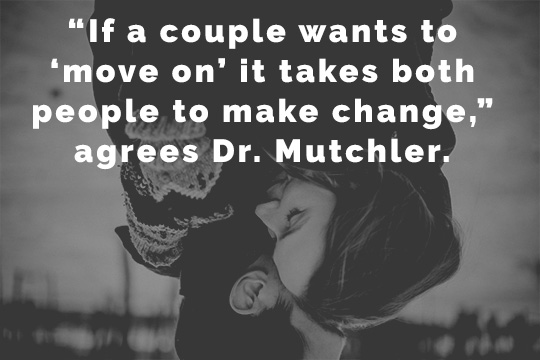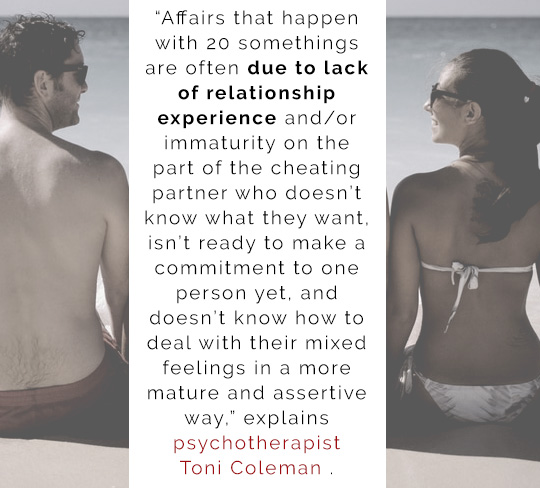There are few things more closely related to the end of romantic relationships in the popular consciousness than infidelity. Countless couples have been split apart by cheating, and it’s not hard to find people who see it as grounds for an immediate breakup, no ifs or buts.
It’s perfectly understandable that such a momentous breach of trust would be a dealbreaker for many, but does a failure of monogamy always have to mean the end? Is it possible for a relationship to come back from the brink after an affair, and if so, how?
Here’s how to salvage your relationship after your partner’s been unfaithful – and how to know when not to.
What happened?
One of the first, and most important, things to ascertain is exactly what’s happened. While some people take the simplistic line that ‘cheating is cheating’, in reality there’s a world of difference between a months-long, committed affair and a bit of drunken making out. That’s not to say that one-off betrayals are acceptable, or hurt any less, but they suggest different things about the mindset and motivations of the cheater, and how to come back from the incident.
A one-off incident suggests a breakdown in willpower, the guilty party giving in to a temptation that all of us have likely felt at one time or another in any lengthy relationship. If alcohol or drugs were involved, they just make it that much harder to think clearly in the moment. They don’t excuse the action – and booze is unlikely to lead anyone to cheat who hadn’t at least considered it sober – but you might see them as mitigating factors.
Lengthy affairs are a whole other issue. If your partner’s essentially been conducting an entire relationship behind your back, that’s a long-term, thought out breach of trust – there’s nothing spur of the moment about it. This is likely to be harder for you to forgive, and harder for your partner to give up, and suggests more serious problems in the relationship – not the least trust – which will take time to rebuild from. It’s certainly not impossible to come back from this type of infidelity, but expect it to take work and time.
“Who was the affair with?” asks Dr. Matthew Mutchler, Assistant Professor of Counseling Psychology at Delaware Valley University. “Cheating with your partner's friend, your own coworker or friend, or somebody else known to both of you tends to be more difficult to ‘move on’ from than affairs with comparative strangers. How emotional was the betrayal? How deep does it go? In how many ways were relationship boundaries violated?”
Note that knowing what happened doesn’t have to mean knowing the intimate details of the affair – and in fact, for many, this can be more harm than help. There’ll be an immediate temptation to quiz your partner on everything they did, as your mind works to process the situation, but resist. In time, you may want to know, and it may even help you to move on, but obsessing over the intimate details is unlikely to help either of you deal with the situation in the short term.
Is your partner ready to work at it?
Once you understand exactly what the breach of trust involved, the next important step is to understand how your partner feels about the situation, and this can be complex.
First things first, are they genuinely apologetic for what they’ve done? Did they come to you to discuss and come clean about what happened? Or did you find out before they came to you? They may regret getting caught, and might be sorry that you got hurt, but the important question is whether or not they’re truly sorry for breaking your trust in the first place. It’s all very well if they regret causing you pain, but that could just be incentive for them to be more careful about getting caught next time, so that you never find out again. If they’re not truly sorry for the affair itself, rather than its fallout, then they’re not ready to work at the relationship yet.
This is even more complicated if they were caught up in a lengthy affair, with its own emotional attachment, as they could still be grieving the end of that relationship, and perhaps even considering leaving you for them. It’s hopeless working at your relationship if their head is still stuck on another, especially given the hard work ahead.
“For this to be worthwhile, and for it to work, both members of the couple must want to stay together no matter what, be willing to do the work required, and have discontinued the affair,” argues psychologist Dr. Nikki Martinez.
And that hard work itself is one of the toughest things for the cheating partner to face up to. Rebuilding a relationship after an affair is far, far tougher than working on it from scratch. It can take months, even years, to rebuild trust, and there’ll be countless setbacks along the way. You’ll argue, you’ll fight, you’ll each want to give up at some point along the way. You both need to be ready and willing to work for it – and if they’ve cheated on you, there’s a risk that they’ve already mentally checked out. Don’t go down this path unless you can be confident that they’re serious, committed and ready for the hard graft ahead.
“If a couple wants to ‘move on’ it takes both people to make change,” agrees Dr. Mutchler. “The one who was unfaithful needs to rebuilt trust – a slow and frustrating process – and show his or her commitment to the relationship. Not through buying gifts or acts of contrition, but through ‘being there’ day to day in the relationship. Doing whatever ‘normal’ couple things are in that relationship.”
Once a cheater, always a cheater?
Perhaps the most often cited reason for not even trying to make a relationship work after an affair is the old adage that cheaters never change. Many take the view that there’s some fundamental moral defect that makes some people willing to cheat on their partners, and that once someone has committed infidelity once, you can be sure they’ll do it again, because it’s just in their nature.
As comforting as this outlook might be to those safe in the knowledge that they’ve never cheated on a partner, it’s a pretty simplistic way of viewing people. There are all sorts of complicated reasons someone might cheat, from dissatisfaction to depression, loneliness to lust. It’s rarely as simple as branding the cheater a bad person – they’re just a regular person who did a bad thing, and just about any of us could do the same under the right circumstances.
This is especially true for young people in relationships, who are likely still getting to grips with themselves and their needs, psychotherapist Toni Coleman argues. “Affairs that happen with 20 somethings are often due to lack of relationship experience and/or immaturity on the part of the cheating partner who doesn’t know what they want, isn’t ready to make a commitment to one person yet, and doesn’t know how to deal with their mixed feelings in a more mature and assertive way,” she explains.
Advice columnist Dan Savage coined the term ‘monogamish’ for his own relationship, urging people to take a more open-minded view about the very real challenges of monogamy. “Admitting that it’s a struggle makes a monogamous commitment more meaningful,” he argues in his book American Savage, adding, “even if you’re in love with your partner, and even if your partner is in love with you, you will both be attracted to other people.”
“If you have been with someone for twenty, thirty or forty years and your spouse only cheats on you once or twice, your spouse is good at monogamy. Not bad at it. Good at it.”
Savage’s outlook might be a little extreme for some, but it’s a worthwhile reminder that infidelity is rarely as simple as pointing a finger at the guilty party and declaring them a bad person. Monogamy is tough, especially in long relationships, and whatever the reason for your partner breaking it, it doesn’t all of a sudden make them evil. If you’ve spent months or years with them, they’ve hopefully got something going for them – if they were such a bad person, you’d probably have spotted it when they spent their time kicking puppies and stealing from the homeless. Cheating doesn’t make them a bad person, and doing it once doesn’t guarantee they’ll do it again.
They made a mistake, and the big question now is whether you can forgive them for it.
Repairing the relationship
If you’ve both decided to put in the work and bring this relationship back from the brink, it’s time to get started.
Here’s what you need to do:
- Get some space. You may have already done this in deciding whether or not to stay together, but if not you need some time apart. If you live apart, stop seeing each other for a few weeks. If you live together, one of you needs to crash with a friend or family for a bit. Time apart will give you both some distance from the affair itself and from the fight you likely had about it, and allow you both the chance to set your priorities.
- Identify the problems. Infidelity rarely comes out of nowhere, and it was almost certainly provoked in part by underlying problems in the relationship – some of which may well be your own fault, as hard as that is to admit. Use your time apart to reflect on what’s good and bad between the two of you, finding the faults that led your partner astray and (hopefully) coming up with ways to work on them.
- Cut off contact. This is a big one: the cheating partner needs to cut all contact with the other man. They may well be reluctant to do so, but this one has to be a hard line – working on your trust will be impossible otherwise, and it’s the best way they have to prove their commitment to the relationship. If the affair was with a co-worker or similar, this might be tough to do immediately, but in that case you need to agree a plan for them to change jobs or do whatever else is necessary to cut that person out of their life.
- Re-discover the romance. No matter what issues you identified in your relationship as a result of the affair, it’s likely that the slow decline in romantic gestures common to most couples was part of it. As part of building things back up, both of you need to commit to bringing a bit of romance back, from regular date nights to small, thoughtful gifts. Remind yourselves of how exciting your relationship can be and how much you have to offer one another.
- Start up the sex. It may seem counter-intuitive, but this one might be easier than it sounds. Most people expect that returning to sex after infidelity is difficult and emotionally fraught. And while it can be, it’s also common for many people to find their sex drive with their partner stronger than ever before, the mind doing its best to ‘reclaim’ them. This is only temporary though, and you need to be ready for some unexpected emotions when you try and take things to the bedroom, not least your thoughts turning to the affair in the middle of the act. There’s nothing to do here but push it out of your mind, stop if need be, and remember that in time it won’t happen.
- Re-build the trust. This is really what just about every other step is about working towards. The biggest blow to the relationship is the blow to your trust in your partner – and perhaps theirs in you, if you went behind their back to discover the affair. This takes time, and sometimes never comes back entirely – there might always be that niggling doubt in the back of your mind. All you can do is work at it, do your best and be willing to risk yourself for the sake of love. It may take months or years, but you can learn to trust them again, no matter how impossible it may seem.
Moving forwards
No relationship can ever go back to how it was before an affair. It’ll be changed, in some ways for the worse, but in some for the better. Many couples report that infidelity left their partnership stronger than it ever had been before, the process of working through it together strengthening their bond, giving them the chance to address problems that they’d neglected in the past.
If you’ve just discovered that your partner cheated on you it can seem that your entire world is crashing down around you and that things are irreparable. It’s easy to hate them, to paint them as a villain in your own mind. But if they’re truly sorry, if you love them and if you’re both willing to put in the work work, it is possible to turn things around and come back stronger than ever.
If that’s not enough to convince you, then see it as a vital aspect of self-improvement, something, Primer readers should be familiar with.
“If you just end a relationship after an affair is revealed chances are you'll carry a lot of baggage to another relationship or pick someone similar to your last,” explains relationship therapist Larry Shushansky. “It's better to try to work out what went wrong with your relationship and try to repair the hurt and broken trust. Then, if it doesn't work out, you will have grown out of the relationship as opposed to having left the relationship with baggage.”
















![It’s Time to Begin Again: 3 Uncomfortable Frameworks That Will Make Your New Year More Meaningful [Audio Essay + Article]](https://www.primermagazine.com/wp-content/uploads/2025/01/begin_again_feature.jpg)

